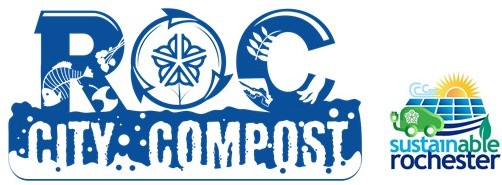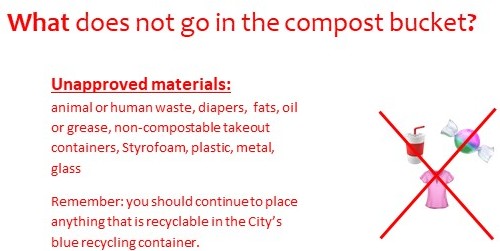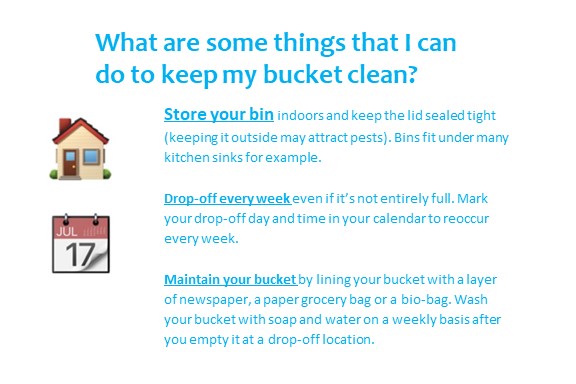Free registration for new participants is open for a limited time. Please register here.
Please note: to be eligible, you must be a Rochester resident and only one member per household may register. A City staff member will contact you to confirm registration and next steps.
New and existing participants can choose to drop-off food waste at any of the three locations at Maplewood Park, Cobbs Hill Park and Genesee Valley Park. For details, see Drop-off locations and schedules section below.
What is composting?
 Composting
is the practice of separating organic waste (food waste and more) from regular
land-fill bound household garbage so that it can be processed into a
nutrient-rich material (compost) that can improve soil quality. After preparing
or enjoying a meal, food scraps from your plate and cutting board (and more) can
go into a compost bin provided by the City. By separating your food scraps at
home, you are helping to send less waste to the landfill and instead recycle it
into compost so that we can create a healthier environment for everyone.
Composting
is the practice of separating organic waste (food waste and more) from regular
land-fill bound household garbage so that it can be processed into a
nutrient-rich material (compost) that can improve soil quality. After preparing
or enjoying a meal, food scraps from your plate and cutting board (and more) can
go into a compost bin provided by the City. By separating your food scraps at
home, you are helping to send less waste to the landfill and instead recycle it
into compost so that we can create a healthier environment for everyone.
Why compost?
Rochester’s
Community-wide Climate Action Plan recommends the implementation of an organics collection and
composting program to reduce the amount of waste sent to landfills and, as a
result, reduce landfill greenhouse gas emissions (methane) that worsen climate
change. Through
composting, food scraps can be turned into nutrient-rich soil that can be used
for gardening and potting household plants that filter oxygen in our homes. The ROC City
Compost program is part of the City’s larger Food Waste Reduction,
Donation and Organics Recycling Program. The City of Rochester believes that
“Food Is Treasure”
and that we can turn “trash”
into treasure. Learn more about the City’s Food Waste Prevention, Donation and
Organics Recycling program and “Food Is Treasure” Food Waste Education Guide here.
How does the ROC City Compost program work?
Drop-off locations and schedule:
Once you
have signed up for the program and have your toolkit of materials, you may drop-off your food waste at the following locations and times on a weekly basis.
Maplewood Park (new)
Parking lot by Maplewood Rose Garden
250 Maplewood Ave, Rochester, NY 14613
Tuesdays 9am - 2pm
Cobbs Hill Park
Parking lot
by Lake
Riley Lodge
100 Norris
Dr. Map
Saturdays 9am-noon
Wednesdays
1-4pm
Genesee
Valley Park
Parking lot
by Sports
Complex
131 Elmwood
Ave. Map
Saturdays
1-4pm
Wednesdays 9am-noon


For more info on the City's recycling program click here.

Composting FAQs #2
1. Where does our food waste go after it is picked
up? Who is processing the food scraps? What is being done with the compost?
A: The food waste generated from our
program is brought by our waste hauler (Impact Earth) to a vermicomposting facility
(worm farm) called Organix
Green Industries located in Seneca Castle NY. Once the food scraps are recycled into
compost, ROC City Compost will give back a portion of the compost to
participants. Check back here for updates about the compost giveback.
2. If this program is successful, will it result in
citywide pick up compost?
A: Based on the outcome of the one-year pilot, we are considering expanding the drop-off to a new location that will be announced soon. In the future, we may consider the feasibility of curbside pick-up. Other factors such as funding availability and interest from a broader participant base would determine how the program can expand.
3. If we have more compost than what fills our
City-issued bucket, can we bring that compost in an extra bucket to drop-off?
A: Yes
4. Can drop-off locations be added and can the
hours of drop-off be adjusted?
A: Based on the outcome of the pilot
program and feedback from participants and the public, we will consider adding
locations and adjusting hours.
5. The Do(s) and Don’t(s) section states that fat
and oil cannot be composted – what exactly does that mean? Can I compost food
that is baked or cooked with fat & oil?
A: This just means that we do not want you
to compost large quantities of fat or oil such as a quart of used cooking oil.
It is OK to compost anything baked or cooked in or with oil and fat or paper
towels used to wipe off oil and fat.
6. Can I compost yard waste?
A: Yes, you can compost plants and
vegetable stalks, however, any yard waste that is more appropriate for leaf
pick-up should be designated for leaf pick-up. To learn more about the City’s
Fall Leaf Collection, visit: https://www.cityofrochester.gov/leaves/
7. How much compost tonnage has the program
generated so far? Will the City be implementing some kind of dashboard so that
participants can see the progress as the program moves along?
A: As of February 2024, ROC City Compost
collected 294 tons of food waste.
Composting Webinar Series
The City of Rochester has partnered with Cornell Cooperative Extension of Monroe County to provide a webinar series.
Webinar 1: Why Compost? (Link to zoom recording)
Webinar 2: Basics of Composting (Link to zoom recording)
Webinar 3: Compost FAQs (Link to zoom recording)
Webinar 4: What to do with compost (Link to zoom recording)
Webinar 5: Food Waste Education (Link to zoom recording)
Webinar 6: Compost Past & Future (Link to zoom recording)
Visit http://monroe.cce.cornell.edu/horticulture/compost-resources
to learn more about the Cornell Cooperative Extension of Monroe County’s
composting resources.
